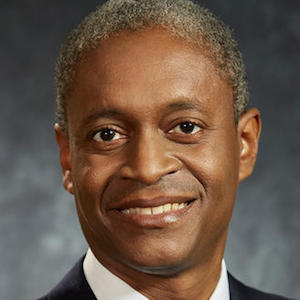 Raphael Bostic, the Judith and John Bedrosian Chair in Governance and the Public Enterprise and director of the Bedrosian Center on Governance in the School of Public Policy at the University of Southern California, Los Angeles, was selected as president of the Federal Reserve Bank of Atlanta. He is the first African American to lead one of the Fed’s 12 regional banks.
Raphael Bostic, the Judith and John Bedrosian Chair in Governance and the Public Enterprise and director of the Bedrosian Center on Governance in the School of Public Policy at the University of Southern California, Los Angeles, was selected as president of the Federal Reserve Bank of Atlanta. He is the first African American to lead one of the Fed’s 12 regional banks.
“It’s not lost on me that I am the first African American to lead a Federal Reserve institution,” Professor Bostic said. “It’s kind of daunting. It’s an overwhelming thought. It’s a tremendous privilege. I look forward to this being a stepping stone for many others to have this opportunity as well.”
Professor Bostic joined the faculty at the University of Southern California in 2001. He spent the year 2009 to 2012 as assistant secretary for policy development and research at the U.S. Department of Housing and Urban Development.
Dr. Bostic is a graduate of Harvard University, where he majored in economics and psychology. He holds a Ph.D. in economics from Stanford University.











Proud of your accomplishment!